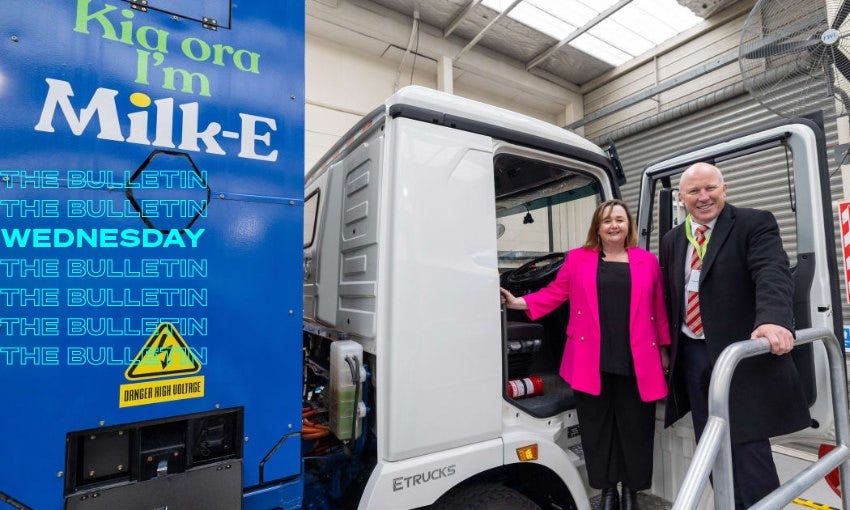An electric milk tanker hits the road but can we power more of them?
As two New Zealand companies roll out electric trucks, the new Transpower chair says we’re living on borrowed time and we need more power.
Mōrena and welcome to The Bulletin for Wednesday, July 20, by Anna Rawhiti-Connell. Presented in partnership with Z Energy.
In today’s edition: Covid deaths reporting to change; government loosens restrictions on Kiwibuild; corporate profit in NZ warrants a “serious look”; but first, powering our growing fleet of electric vehicles.
Megan Woods with Fonterra‘s Fraser Whineray and Milk-E (Photo RNZ/Supplied)
Electric trucks for Fonterra and New Zealand Post
On Tuesday, Fonterra introduced Milk-E, the first electric milk tanker in its fleet. I can’t help but think of WALL-E, the loveliest robot from Pixar’s 2008 animated fable about over-consumption. It was actually named by a Murchison farmer after an always risky “name the .…” competition. Well done to that farmer. Milk-E is part of the company's decarbonisation programme and runs on batteries. Energy minister Megan Woods was there for its launch. New Zealand Post has also unveiled an electric truck. It does not have a name. I mean, Post-E is just sitting there, but please feel free to send me suggestions. The truck runs on a hydrogen-powered fuel cell.
Sales of hybrid EVs up 482% this year
Electric vehicles (EVs) have gone from being something of an anomaly and are on their way to becoming ubiquitous, quickly. Chris Schulz recently looked into demand for electric vehicles and found there is a waiting list of up to a year for some brands. Sales for battery electric vehicles are up 178% this year as at the end of June, while sales for plug-in hybrid electric vehicles are up 482% for the same period according to the Automobile Association. The government wants 30% of New Zealand’s light vehicle fleet to be electric by 2035 with transport minister Michael Woods recently flying into Norway to try and get EV manufacturers to sell more cars to New Zealand.
Demand for energy set to double
The supply of vehicles is only one part of the equation. Electricity generation capacity and a network of charging stations to power a growing electrified fleet are core infrastructure needs. To meet the government’s goal of net zero emissions by 2050, we need to significantly grow our clean electricity generation over the next 30 years. As the Infrastructure Commission noted in their new strategy released in May, getting consent for building the required infrastructure is hard. RNZ’s Hamish Cardwell has taken a look at the huge change underway in the electricity sector with demand for energy set to double as we move to electrify the country's cars and trucks and industrial boilers. The transition, he writes “is tricky but doable”.
“We’re living on borrowed time” says Transpower chair
Over the weekend the Herald’s Jamie Grey profiled the new chair of Transpower, Keith Turner (paywalled). Turner says we take for granted what electricity does, yet it makes up 2.5% of GDP and supports the other 97.5% of GDP. “Without it, we wouldn't have any GDP at all. It is profound. It's fundamental and to me it's as important as land, air and water" he says. Turner’s comments about New Zealand’s electricity generating capacity however, are pretty blunt. He says we need more electricity and that “we’re living on borrowed time”. Transpower modelling points to a need for 70 terawatt hours in 30 years' time. New Zealand currently produces 40 terawatt hours per year. Transport, Turner says, “is going to be a big chunk of that”.
Do you have an idea that could change the world?
For more than 100 years 3M has used science to improve lives with iconic innovations like Post-it Notes, Scotch tape, and more. The 3M Inspire Challenge invites undergraduate tertiary students to tackle real-life business challenges with innovative, equitable and sustainable solutions.Prizes include up to US$7,000 and internships at 3M. To learn more about the competition and to enter, click here. (Sponsored)
Covid deaths reporting to change
We’ve sort of just started writing phrases like “death reporting” about Covid and before we get into this, I’d just like to note that it still feels consequential and awful to be writing these kinds of headlines. As Stuff’s Hannah Martin explains, the Ministry of Health will now report deaths because of the virus and deaths where it was a contributing factor, instead of reporting all people who died within 28 days of a Covid infection. Dr Ashley Bloomfield said yesterday that case numbers had slowed but not stopped. Hospitalisations are still sitting around the numbers we saw in April and hospitals are changing their visitor policies to try and protect vulnerable patients. In all hospitals and healthcare facilities under the jurisdiction of Te Whatu Ora Waitaha (the former Canterbury DHB), masks will be required and people under the age of 16 will not be allowed to visit unless the visit is pre-arranged on compassionate grounds.
Government is making changes to its Kiwibuild policy
As 1News’ Katie Bradford reports, price and income caps are changing for the Kiwibuild scheme and in some instances being removed. For multiple buyers, the income threshold will be lifted from $180,000 to $200,000. For individuals with dependants, an income cap of $150,000 is being created. Those that need bigger or more accessible homes will have caps removed entirely. To quote Lizzo, I expect many will be saying “it’s about damn time”. A new rental build scheme also kicks in soon which will allow not-for-profit organisations to build rental developments for lower income people who cannot afford a market rent but can’t access public housing. Despite a record drop in house prices in June, the average asking price for a property in New Zealand is still $925,150.
Data on corporate profit and inflation in NZ not “smoking gun” but warrant a serious look
Picking up on yesterday’s Bulletin, the Herald’s Thomas Coughlan takes a deeper look at whether corporate profits are driving inflation in New Zealand. Ultimately, it’s not clear as the data is messy but some of the sectors Coughlan looks at have done very well, despite the current challenges. CTU economist Craig Renney said the data we have is not a "smoking gun" proving massive excessive profits due to inflation. Renney adds that what data we do have, combined with what can be seen overseas "warrant a serious look at how profits are interacting with inflation". Green Party finance spokeswoman Chlöe Swarbrick said a windfall tax was one tool that could be used to do "something", but said the party preferred more permanent solutions. National's finance spokeswoman Nicola Willis was not so keen, saying her party did "not support a new super tax on business".
All week on The Spinoff, we are examining our relationship with menstruation in Aotearoa. And, just like real periods, the content will be both heavy and light and will probably make you laugh and cry all at once. Read more Bleed Week content here.
Click and collect
Residents in parts of Canterbury and Otago wake up to a big clean up after “one-in-a-100 year July weather event”.
Soaring fuel company margins confirmed by the government.
Former All Black Keven Mealamu to stand for Auckland Council.
Canterbury regional council leaders say they've had no requests to help fund Christchurch stadium.
Tourism Fiji issues a personal invitation to outgoing Director General of health, Dr Ashley Bloomfield.
Got some feedback about The Bulletin, or anything in the news? Get in touch with me at thebulletin@thespinoff.co.nz
Like what you’ve read today? Share The Bulletin with friends, family and colleagues.
As we ride out the second wave of the omicron outbreak, it remains as important as ever to try and break the dangerous cycle of infection and reinfection. Siouxsie Wiles and Toby Morris explain how we can do it. Graham and Kevin Parker share their tips on how to DIY a funeral. Shanti Mathias gets lost in the churn of short-form video as social media platforms clamour to copy TikTok's winning formula (poorly). Chris Schulz talks to a guy who spent lockdown creating a massive inflatable obstacle course for grown-ups. Various people who menstruate share their outstanding period horror stories.
Play shifts to the ultimate arena, LinkedIn
All Blacks communications manager Jo Malcolm has revealed that it was her call to cancel Ian Foster’s press conference on Sunday in a post on LinkedIn. Malcolm writes that she “felt he [Foster] needed a day or so to work out what he wanted to say and not just be a punching bag for the media, who lets [sic] be clear, wanted blood”. Malcolm was responding to a post (also on LinkedIn) from former NZ Rugby communications manager Mike Jaspers, who had criticised the move. Scotty Stevenson has responded to this development in perhaps the only form left available to us - blistering satire - on The Spinoff. NZ Rugby will meet today where it might discuss this among other things.
The fate of our national estate
Today’s long read is from George Driver in this month’s North and South A new report calls for partnership with tangata whenua to be at the heart of our national parks. Conservationists say this could weaken environmental protections. Iwi say it will bring an end to 135 years of alienation from the land. Who is right, asks Driver. If you’re interested in hearing more about this, Ellen Rykers is taking a look at it in our new environment newsletter, Future Proof which, if you subscribe to now, will be in your inbox this afternoon.














Deliver-E Truck 🛻